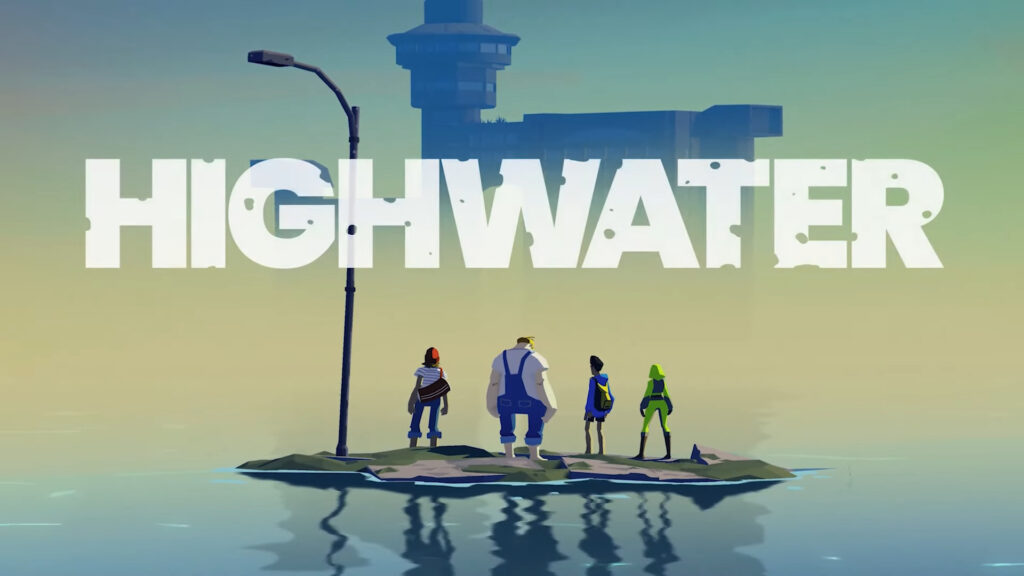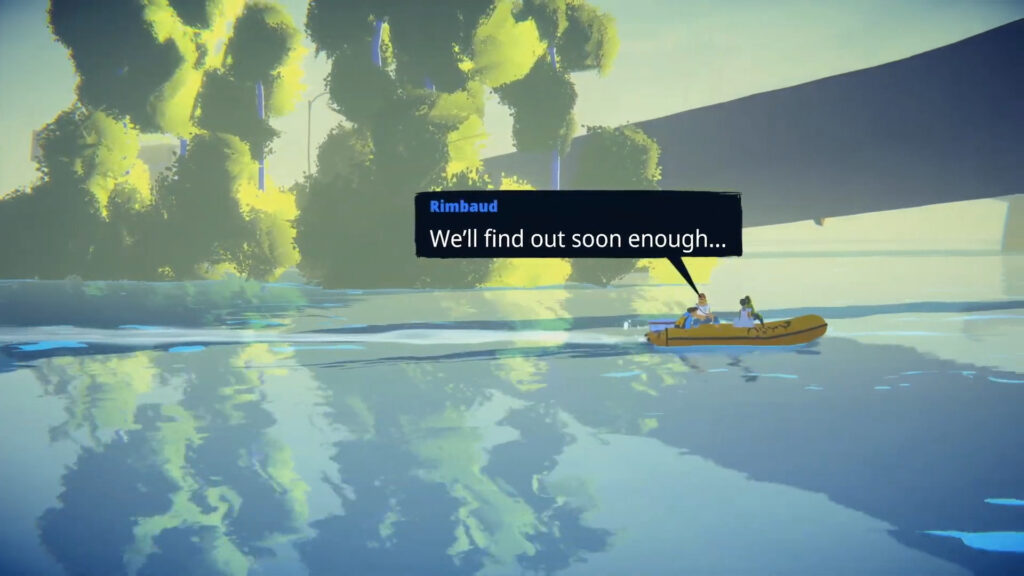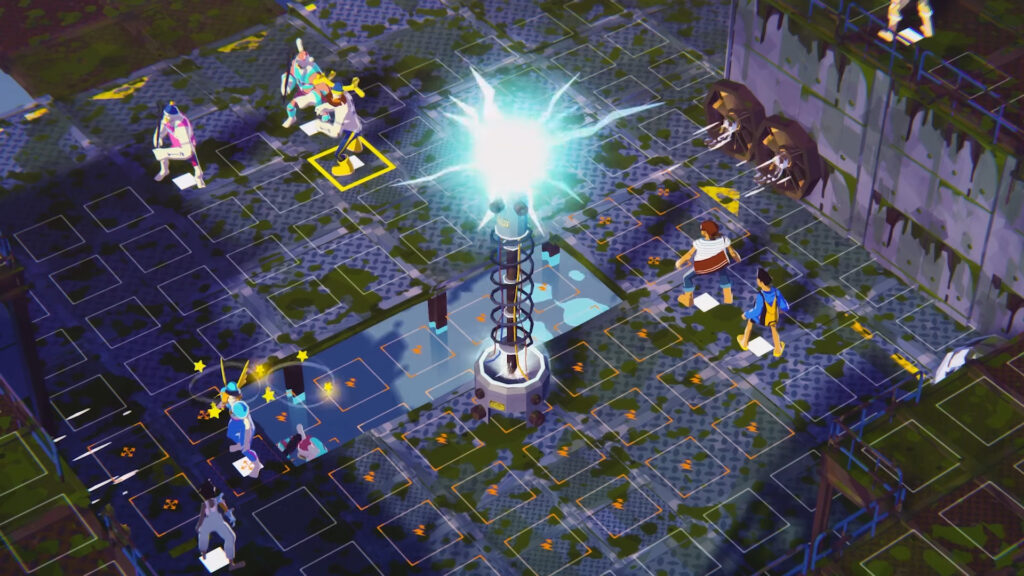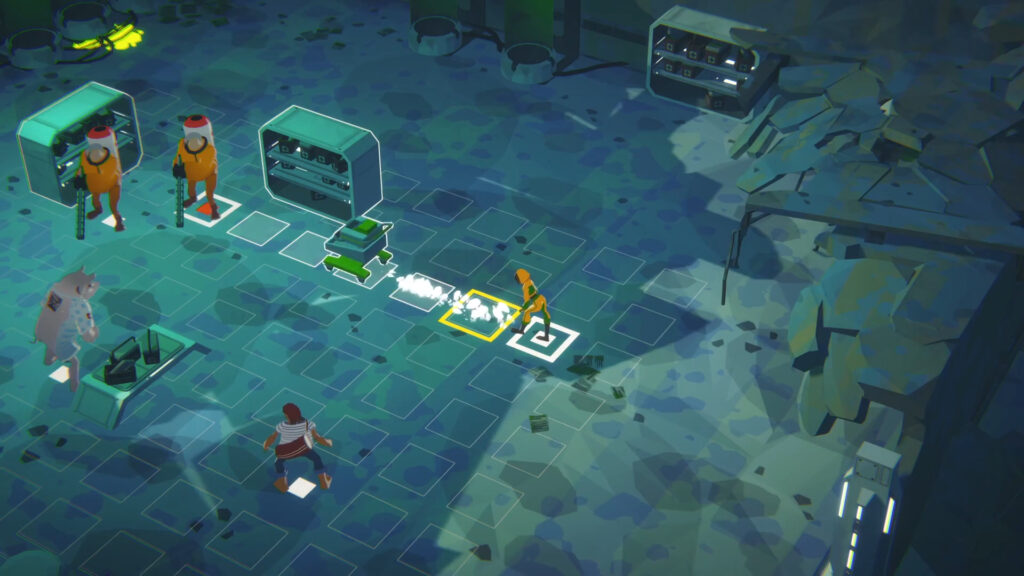
Developer: Demagog Studio
Publisher: Netflix Games, Rogue Games
Platform: Switch, PC, PS4, PS5, Xbox One, Xbox Series X|S, iOS, Android
Tested on: Switch
Highwater – Review
If you’re a Netflix subscriber, you may already be familiar with Demagog Games’ Highwater, as the game debuted through Netflix Games. Exactly one year after Highwater was released on mobile devices via the streaming service, it now arrives as a standalone console release. Well, we say standalone, but as you’ll see, Highwater is part of the bigger, interconnected universe that the developer has been building with its other games. If you’ve played any of Demagog Games’ other titles, you’re probably curious how Highwater fits in, and if you’re new to the developer’s offerings, you might wonder if this is a good entry point. Well, we’ve got your back! Join us as we take an in-depth look at Highwater.
Story
Although Highwater presents itself as a standalone story, it is set in the same world as Golf Club Wasteland and The Cub, two other Demagog Games titles. While the timeline is a bit muddy, it’s reasonable to assume that Highwater takes place the earliest out of these three titles, given the state that the world is in. Things aren’t quite as bad as they will be in the future, as we know this version of Earth eventually turns into a toxic wasteland/golf course. For now, it’s *just* flooded, and the rich people are still in the process of escaping Earth. Highwater focuses on a group of regular survivors who are trying to sneak onto one of the rockets that are intended to take those same rich folk to Mars. Central to the story is Nikos, a teenage boy with a boat. Hailing from Hightower, the final safe zone, he is trying to make his way to Alphaville, the fortified city of the elite, as the desperation around him grows. The story that unfolds carries the same message as Golf Club Wasteland and The Cub do, warning about the consequences of climate change, as well as delivering cynical commentary about the attitude of the corporate elite. If you liked the previous games’ narrative, you’ll like what Highwater has to offer, although we did feel not all of the dialogue was equally well-written.
Graphics
Visual consistency is key here, as Highwater sticks to the same visual style as the other two games, tying everything together. For as bleak of a setting as Highwater presents, the game looks absolutely gorgeous. The game succeeds in conveying the desolation of the flooded world by showcasing the beauty of its emptiness. A significant chunk of the time, you’re looking at unchanging scenery, yet we never grew bored of it as this made sense within the story. Seeing massive ruins appear from the fog never grew old, and exploring the islands delivered plenty of jaw-dropping vistas as well.
Sound
The way Highwater’s soundtrack is presented is yet another nod to Golf Club Wasteland. In both games, music comes to you through a radio station. The songs you hear are performed by in-game characters you’ll encounter as you play through Highwater, which adds an extra dimension to both the game and the individual songs themselves. The radio is also used to deliver narrative progress in the form of news broadcasts.
Gameplay
Given the narrative, we were expecting Highwater to be a survival game, but instead, Demagog Games are treating us to a turn-based strategy title that focuses on grid-based combat as well as exploring its haunting post-apocalyptic world. Now, when we say explore, don’t go expecting an open-world adventure, because although there are plenty of secrets to discover, Highwater still offers a linear experience that sees you travel between the few remaining bits of land left in the now-flooded world. While you’re on these small islands, you’ll encounter new characters that can join your party as well as find useful equipment that will help push your adventure forward. Not everyone you encounter is friendly, however, as there are hostile scavengers on these same islands, which is where combat comes into play.
The turn-based combat in particular stands out because of the unconventional way battles are designed to be played out. You can’t just hope to brute force your way through, as that’s the quickest way to defeat. Instead, you need to take your time and look around the battlefield for objects that you can interact with. Derailing a train to crash into your enemies or simply pushing over a tree can quickly turn the tide in your favor. In this way, Highwater’s battles often feel like carefully designed puzzles. While it’s definitely satisfying to see your meticulously crafted plan come to fruition, it also makes Highwater feel like there is very little freedom in how you can clear a battle. This didn’t necessarily bother us, but if you’re the kind of player who prefers rolling with the punches rather than sticking to the “right” way to play a game, you might find this aspect of Highwater a letdown. It all depends on the mindset that you approach the game with, however, as combat breaks up what is otherwise a surprisingly relaxing and tranquil experience. Highwater ultimately isn’t about delivering deep gameplay but instead seeks to make an impact through its atmosphere and narrative, while also carrying an important environmentalist message.
We’ve discussed both the narrative and audiovisual connections between Highwater and its sibling games, but in terms of gameplay, the three titles couldn’t be any more different, with Golf Club Wasteland being a golf simulator and The Cub a 2D platformer. Being developed for mobile devices first and foremost, it shouldn’t come as a surprise that Highwater is more suited to short bursts of play, not in the least because of the gameplay’s slower pacing. This makes sense given the overall short length of the game, as Highwater clocks in at around eight hours. This is the kind of game that actually benefits from being savored, as taking the occasional break makes the poignant moments all the more impactful and immersive. The one thing that speaks against picking up Highwater is its price point. Coming in at around €18, the game is more expensive than a month’s worth of Netflix, and given how short it is, it’s easily completed over the course of an evening or two. If you’re already a Netflix subscriber, you can already play the game for free, and even if you’re not a subscriber, it might just be worth it to get Netflix for a month, play Highwater, and then cancel your subscription. We’re all for supporting the developers and something can be said about game preservation instead of relying on a subscription, but the RRP is simply too high by comparison. If and when Highwater gets discounted, it’s worth adding to your permanent library.
Conclusion
As a whole, Highwater carries more strengths than weaknesses. The occasional dialogue hiccup and unorthodox approach to how combat needs to be resolved may not sit well with everyone but the tranquil atmosphere, sense of exploration, and strong audiovisual presentation lift Highwater to another level. The main weakness here is the price point, both compared to the game’s short length and its availability as part of Netflix Games. If you’re already a subscriber, check out Highwater on your mobile device right now, but otherwise, waiting for a cheaper price seems to be the way to go.









No Comments